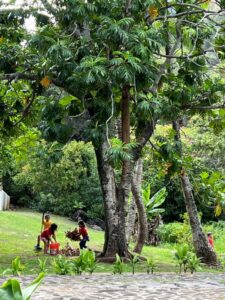Panel recommends forgiveness of $4 million loan to Ka Hale A Ke Ola
A Maui County Council committee is proposing to forgive repayment of more than $4 million that the county loaned in 1998 to Ka Hale A Ke Ola Homeless Resource Center for construction of its Hale Makana O Waiale rental housing facility in Wailuku.
On Aug. 6, the Housing, Human Services and Transportation Committee voted 5-0 to recommend forgiveness of the entire outstanding debt, including principal and interest, and to have a resolution “reflect the council’s desire that savings realized from forgiveness of the debt be used in furtherance of KHAKO’s mission.”
Committee Chairwoman Stacy Crivello voted in favor of the recommendation, along with Council Members Gladys Baisa, Bob Carroll, Don Couch and Don Guzman. Council Members Riki Hokama and Mike Victorino were absent and excused. Council Members Mike White and Elle Cochran are not voting members of the committee.
The committee report and a proposed resolution adopting its recommendation is on today’s full council meeting agenda. That meeting starts at 9 a.m. in the Council Chambers in the Kalana O Maui building in Wailuku.
The committee’s recommendation goes beyond, and is more favorable to Ka Hale A Ke Ola, than what the housing nonprofit proposed in an April 28 letter from Chief Executive Officer Erin Lowenthal to then-Department of Housing and Human Concerns Director Jo-Ann Ridao.
Lowenthal wrote that Ka Hale A Ke Ola was prepared to accept four repayment terms:
* Forgiveness of all past due interest.
* No further accrual of interest on the outstanding loan principal of $4,055,000.
* Quarterly loan payments of $25,000 for five years, beginning June 1, 2015.
* Reviews, every five years, of the payment schedule and Hale Makana O Waiale operations to determine if quarterly payments could be revised upward.
Lowenthal also provided the first quarterly payment of $25,000.
The committee report notes that, on the original loan of $4,225,000, the county received payments from 1999 to 2003 of $1,472,530, and, of that amount, $200,000 had been applied toward principal.
The committee report says that members of the panel commented that the loan money was “well spent.”
The committee also noted that the $100,000 proposed for repayment annually could instead be used by Ka Hale A Ke Ola to reinvest in its maintenance needs, its reserve fund and otherwise support the nonprofit.
New Department of Housing and Human Concerns Director Carol Reimann and Deputy Director Jan Shishido were unavailable for comment Monday. A phone message seeking comment from Housing Division officials went unanswered.
Budget Director Sandy Baz said that the proposed loan forgiveness would not have an impact on the county’s budget since the loan already has been provided to the nonprofit. When asked about the repayment of $25,000 per quarter annually and how the county would not see that money return to its coffers if the committee’s recommendation is approved, Baz said that the amount was “not that significant.”
Given the nonprofit’s track record of not repaying the loan over several years, the amount was “not anything that could have been depended upon for budgeting purposes.”
It would take more than 40 years to repay the loan to the county if the nonprofit were to pay $100,000 per year, Baz said.
He declined comment on the policy implications of the loan forgiveness, although he noted that the county provides about $25 million in grants overall annually.
The council committee’s report notes that “it appeared the loan had been ignored for a number of years, and it had taken (the) committee’s diligence to determine the loan’s status and investigate management of the project and repayment options.”
According to the committee report, Lowenthal told committee members that the outstanding debt to the county affects Ka Hale A Ke Ola’s ability to maintain and reinvest in the property. She reported that the facility is in need of roof repairs and irrigation work.
The nonprofit completed a reserve study and, since then, it has been making regular contributions to a reserve account.
Although Hale Makana O Waiale is a separate entity from Ka Hale A Ke Ola, “the debt affects the trust that potential funders have in KHAKO, jeopardizing funding for KHAKO’s homeless resource centers.”
The committee report noted that Ka Hale A Ke Ola receives approximately $500,000 in grant funding from the county annually.
Earlier this month, Hale Makana was providing low-income housing to 751 individuals, including 356 children. The facility has 200 units, including 24 studios, 128 two-bedroom, 32 three-bedroom and 14 four-bedroom units.
Lowenthal told committee members that recent operational improvements included payroll savings from reduced maintenance and operations staff; participation in a Neighborhood Watch group with the Maui Police Department and as a work site for the state Judiciary’s community service program; working with the county Department of Parks and Recreation to add Waiale Park to the list of county parks in which alcohol is prohibited; providing housing to nine formerly homeless veterans and more than 48 U.S. Housing and Urban Development voucher recipients; collaborating with the Maui Food Bank and other volunteer organizations; and working with the Department of Housing and Human Concerns on improving educational opportunities for immigrant residents.
Last year, the county paid consultant Cirrus $15,000 for a study of Hale Makana’s operations. The study found that the housing complex was “significantly over-staffed,” and that improved management could increase rental income by $127,000 per year, decrease payroll by $400,000 annually and reduce other expenses by $100,000.
In the wake of the Cirrus report and its recommendations, Rebecca Woods, the former executive director of the agency, resigned in March 2014, leaving Ka Hale A Ke Ola with interim management. Then about a year ago, Lowenthal stepped in as the new executive director.
According to its website, Ka Hale A Ke Ola Homeless Resource Centers began sheltering the homeless in 1986 in an old church building in Puunene. Since 1993, the program has been housed on a 5-acre site in Wailuku, next to Hale Makana.
Ka Hale A Ke Ola, Westside, was built through a partnership of the state, the county, the Weinberg Foundation and other funding sources, according to the website.
There remains a second, separate $4 million loan provided in 2005 from the county to Ka Hale A Ke Ola for the West Maui facility. There was no immediate update Monday on the status of that loan, but as of June 2013 no payments had been made on it, council members were told at the time.
At that point, $730,000 was due on principal and $1.3 million on interest. Payments on nearly $3.3 million in principal were not yet due at that time.
The council’s committee report said that the proposed settlement of the outstanding debt and interest from the loan dating back to 1998 was unrelated to the loan for the nonprofit’s West Maui homeless resource center.
Aside from housing, Ka Hale A Ke Ola provides low-income residents with basic services, linking them with more than 50 human service agencies to provide for needs such as medical, mental health, vocational rehabilitation and financial services, according to the nonprofit’s website.
* Brian Perry can be reached at bperry@mauinews.com.





